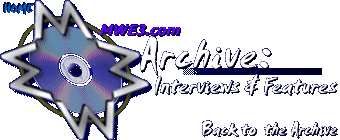
conducted by Robert Silverstein for mwe3.com |
|
||
|
|||
|
Justin Hayward Interview Justin
Hayward (JH)
JH: Good, thank you. RS: What is the inspiration behind the title track “Strange Times” which speaks about arriving at ‘the house of the water sign.? JH: I had the first couple of verses. I had them for years lying around and I never got any further with it. I never got any further then the first bit that goes into the chorus. And then I played it to John. We were looking for something for the new album and together we were able to take it forward and make something of it. It just kind of turned into “Strange Times”. I had the first words, it was just trying to make some sense of it. And I suppose it just evolved, with the turn of the century and the time of Aquarius. RS: Another of your compositions from Strange Times “The Swallow” is about as perfect a pop song as you can get. JH: It took me five minutes to write. And I knew it was right right from the beginning. Everything just fell into place. It was just about my life and what was happening to me and where I live in France. The swallows in the evening...they look as if they’re just playing, but I suppose they’re catching insects. It was just such a beautiful feeling. They come and circle and spiral. It’s on the side of a hill. But the song itself, that’s the real sound of The Moody Blues. There’s no programming or any computers really going on. It’s just a basic rhythm section session sitting down together. The three of us is a rhythm section and that’s what it sounds like with some overdubs. RS: What guitars are you using on the Moody Blues current tour? JH: On this tour I’m still using my ‘63 335. RS: That’s the red Gibson? JH: Yeah, the cherry red Gibson, which I’ve had since ‘67. I didn’t have it new, I wish I had gotten it new, but I didn’t. And I’m using an Olsson acoustic guitar that I’ve used for a few years now on stage, which has probably the best acoustic sounding electric sound of any. Our keyboard player uses one of my Godins for a couple of numbers. Just as a rhythm guitar on a couple of things from the new album. On “Haunted” that we do from the new album and “Words You Say” from the new album. Y’know I need a bit of help to cover the two bases kind of thing, because I played rhythm as well as lead obviously on the new record. And I’m using a Guild, I think it’s a LG 150, a black one, acoustic with a bridge pickup as well on a number. And then I use a reissue, a Gibson reissue dot 335. I think that’s a ‘92 that I found in Gruens in Nashville. Which was just immaculate and exactly the right thickness of neck, it’s a beautiful guitar. I couldn’t resist it really. I use that just on a couple of numbers where it’s convenient. And then I use a big Guild 12 string, acoustic 12 string, a fat old thing just for one song, a song called “Question” that’s in an open tuning. RS: You also have a vintage Martin 1955 D28 guitar? JH: Yeah I have a ‘55 D28, I have that since the ‘60s. And I have a D18 and a D21 12 string. And I have a Gibson 12 string acoustic and I have a J200 as well. That’s a beautiful guitar. It’s one of the very few J200’s I’ve ever heard that sounds really nice. And I’ve got a little Epiphone acoustic as well that’s really tight and clean and I use that on the record quite a bit. I use that on “English Sunset”. RS: The final track on Strange Times, “Nothing Changes” features Graeme’s poetry with additional vocals from you. The track is reminiscent of the ‘60s lineup with Mike Pinder. How would you interpret that song? JH: Yeah, Graeme actually started it as a song that we tried very hard to make work but it just wouldn’t, so we said, ‘let’s take your chord sequence and do some spoken word over it’, and then the rest of us came up with the idea of nothing changes, nothing stays the same at the end. Then, because it was so open musically, y’know you could sort of say ‘hey, what about this, what about that?’ and Graeme was open to saying yes to it. So I said, ‘hey, what about like a Spanish guitar solo’? I think that’s the Martin D28 in there. And so it was wonderful to sometimes have that because with myself and often John, y’know we’re very rigid in what we want and very particular and there’s very little freedom, but with someone like Graeme who’s maybe not absolutely sure of exactly what he wants you can stick all sorts of ideas in there and it makes for a very interesting combination. RS: The Hayward/Lodge track “Sooner Or Later” is another obvious standout on Strange Times and it features a great round of vocals from you, John as well as Ray Thomas. JH: Yeah, we started off on that I remember at my old house in London with that. It was like a “La Bamba” kind of thing. It was our version of “La Bamba”. We started off with this chord sequence and all we had was the words ‘sooner or later’. And then we decided to make it a ‘list’ song. Sting does alot of those. The lyric is just one thing after another in a kind of list. And so we never thought much more about it. It was one of the first songs we recorded. It was like a test song that we did for the album to see whether things would go well when we first met our keyboard player Danilo, who did the album with us. Yeah, it turned out really good, it turned out really well. We just thought it would be really interesting if instead of one of us singing it, which is how it was originally...it was either gonna be me or John singing it exclusively...that we thought, maybe we should just take a line each and see what happens. It was a really fun vocal session because of that. The other guys participated alot more because they were involved. RS: The Moodys 1988 album Sur La Mer had some great songs as well. What does that title mean? JH: On the sea. RS: I enjoyed your track “Vintage Wine” from Sur La Mer. Do you still get nostalgic for the ‘60s these days? JH: Well, I can remember it, which sometimes means I wasn’t there! (laughter). I get nostalgic for the kind of brotherhood of the ‘60s particularly between musicians and I find that doesn’t exist really so much anymore. I think everybody knew each other. It was kind of just being a musician made you a member of a kind of club and you could speak to anyone. You could speak to anyone in any other band and they’d know who you were. But we were just very lucky to have really grown up in the London of the ‘60s, from ‘63 through the rest of the decade. And of course it formed us. And whatever we say, we know that the albums we’ll really be remembered for, apart from probably “Your Wildest Dreams” and “I Know Your Out There Somewhere” as singles, apart from those two, what we’ll be remembered for is the first seven albums, six of which were made in the ‘60s. RS: Even though I admire them all, perhaps my favorite late ‘60s Moodys LP is still the 1969 To Our Children’s Children’s Children album. Do you have any standout memories from that album? JH:
Oh yes I do, very much. I think actually it was a RS: It was also the first album to come out on your label Threshold Records and all the albums from Children’s on clearly printed all instruments performed by The Moody Blues. The sound was so incredible and orchestral, I guess the skeptics couldn’t believe that it was just five guys making all that sound! JH: No, we didn’t find that they couldn’t believe it really. I think what lead to it was that we were the first real band that Decca had in England that started selling albums. And they were big money earners. Most people then, in England then, as you know, were singles selling bands. Like I said we were their first artist who really started selling albums in big volume, and they gave us this studio, just exclusively for us by the end of ‘68-69. We just said rather arrogantly to them, ‘oh, we’d like it to be stocked with every instrument in the orchestra’, just so that could fiddle around on things. Y’know have some fun, get a bit stoned and do some stuff. And so it was. That’s exactly what they did. I mean they were a wonderful company. This was a company run by real old English gentlemen, that held alot of classical catalogs. Alot of beautiful classics. Y’know the best recordings. And that was their forte. So they just said to us, ‘listen, we don’t know what you’re doing, but it’s great, so just get on with it and whatever you want...’, only we had no interference at all. So they had every instrument of the orchestra there. And then just by fiddling around, we could learn enough on that each instrument to do whatever we wanted. Just for a few bars. Just enough to record it. It would be even quicker now, because you could just do it and sample it, put it on the Pro Tools and tune it up and all that kind of stuff. But then it was real. That’s all we just did. We took little samples of things. RS: One of the highlights of my early years was when I saw the Moody Blues at Madison Square Garden back in ‘73 when the group came out played the whole first side of Children’s. Any memories of that? JH: The only time I remember Madison Square Garden was when we played it twice in one day. RS: That might have been the show. JH: We did an afternoon show as well and they gave us the ‘golden ticket award’ for selling more tickets in one go than anybody else had ever done. RS: The follow up to the Childrens album was A Question Of Balance, and the first song “Question” is still one of my favorite Moodys songs. Your great Spanish guitar bursting into the orchestral intro. What about “Question”? JH: Well it was a kind of an angry song. It started off as two songs, which is probably quite evident really when you listen to it. Y’know one fast song and one slow song. It literally got to a Friday night and we’d planned to go in to record on Saturday during the day. It was usually down to me to come up with a song, because everybody knew, ‘ah, Justin’ll have a song’ so nobody else bothered. So anyway I knew it was down to me to come up with a song. People were saying during the week, ‘y’know what are we gonna do?’, ‘oh, don’t worry I’ll have something’, but by Friday night I still didn’t have anything. What I had was two songs that I’d been working on. One very fast in that big open C tuning. A real deep C on the bottom. It’s like a kind of Joni Mitchell tuning actually. And a real slow ballad as well. And at about 4 o’clock in the morning I decided to put them together to at least give it some length, and then go through the words and try to give it some momentum through to lengthen in some way. For me it was a natural rhythm, the speed of that rhythm. Ever since I was a little kid playing skiffle. It didn’t seem to be very fast at the time until I heard it back. The record actually has Mike Pinder playing tambourine on the original track which I think glues it together. I just said to Mike Pinder y’know, I want it to go ‘ba-ba’ (describing two note intro - editor). And he had this Mellotron sound of brass and strings combined. And by the time we put the voices on, y’know it was one of the quickest records we’d ever made. No double tracking. RS: Your song “It’s Up To You”, which started off side 2 of A Question Of Balance is such a catchy pop song that it was clearly another one of the high points on the album. Any recollections about that track? JH: I can get it out and play it on guitar now and it would come flooding back to me. I just know that I love that type of song. I’d done a couple of them before and I’d enjoyed them so much. I think another one was “Lovely To See You”. The same kind of thing. Same key. I think it was in E. It was a kind of natural for the 335 as well. For the D28 and the 335 to make that kind of sound. It’s just about relationships. Y’know the girl that I was with and all that kind of stuff. RS: On your solo albums, you’ve sometimes recorded songs from other composers. On Night Flight you record the Billy Nichols song “Penumbra Moon”. I love Billy’s album Under One Banner. JH: Yes I did know Billy. I knew Billy before and I’ve seen him again since. He’s a wonderful writer. In fact, I have to say that his version was probably better then mine. Mine just got a little bit more noticed than his “Penumbra Moon”. You know I only copied his version with Jeff Wayne, I think, just putting some more arrangements onto it. RS: So how would you describe the differences between your solo albums and your work with the Moodys? JH: With the Moodys I’m aware that when I’m speaking I’m speaking for four other people, or three other people nowadays. And so that it has to be sentiment that they can share or empathize with and have something in common with. But on the solo albums anything goes. I can be stupid in my lyrics or say whatever I want without having to worry about anybody else’s feeling or anybody being embarrassed by it or anything like that. So that’s really the difference, but sometimes, some songs, as soon as they start themselves, as soon as I feel them coming, they’ve decided for themselves whether they’re gonna be Moody Blues songs or solo songs. Also it really depends on the session. If there’s a session coming up I’ll have something ready. RS: The 1981 Moodys album Long Distance Voyager was an interesting return to form and featured a fantastic lead-off pop track with “The Voice”. How would you describe the sentiment behind that song? JH: RS: You’ve no doubt inspired so many younger guitarists. As far as guitar players go, what and who’s inspired you the most? JH: Things that you love in your childhood, y’know they stay with you all your life don’t they? That’s the same with me. And so for me when I was a kid of course it was Buddy Holly...James Burton and then Buddy Holly. I’d have to say Hank Marvin as well. RS: I’m also a big fan of Hank Marvin and The Shadows. JH: Yeah, just for that kind of lightness and touch. I did a gig with him a couple of years ago. I couldn’t believe it y’know. I was standing there thinking, I was watching him thinking, ‘here’s Hank Marvin and look, he’s opening his case and he’s getting out his red Fender! And I’m gonna play with him!’ It was unbelievable! Of course he started and he had this little echo chamber. RS: I have a Shadows album where they do “Nights In White Satin”. Have you heard that? JH: Oh, yeah I have heard that, with the Shadows. So him, and then just alot of people. And then really, Ritchie Havens was a big pal of ours years ago when we met in the ‘60s. I learned alot of his different tunings and different styles, acoustically. Donovan as well with finger picking. Donovan always used silk and steel strings. I always keep one guitar with silk and steel on it for real nice finger picking. That always works well. And Roy Buchanan. I think he’s no longer with us actually. RS: I want to tell you at this point that I still feel that former member Mike Pinder is possibly the most important rock keyboardist of all time. His keyboard and mellotron work on the Moody’s ‘classic 7’ albums is amazing. JH: Absolutely. RS: Any plans for the first Moody Blues recordings in 2000 and beyond? JH: I don’t know. At the moment, Strange Times, we believe in it so much. It’s a kind of small album for us but a big album in our lives. It’s a small made album, it’s just the four of us, y’know in a studio with a keyboard player, no producer. It’s the most important thing in our lives and were gonna keep at it for a couple of years yet. In the meantime were still talking about other projects and different things like that. We’ve been asked to do some music on a movie soundtrack, which we’ll probably go back to Italy to do. But, like I say, Strange Times is what’s in our hearts at the moment, so we must follow it all the way because we don’t have a record company that’s willing to spend alot of money on us so we have to go out and try to sell it ourselves. RS: Thanks a million Justin. JH: The pleasure’s all mine. Anytime. All the best, bye.
|
|||
|
MORE MOODY
BLUES |
Special thanks to Lori Lousararian @ Rogers & Cowan in L.A., Dean DiGiorgio, Ying Duan, Sujata Murthy and Todd Nakamine @ Universal and Mike Keys. | ||
|
|
|||
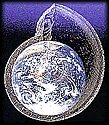 Still
Walking On Air:
Still
Walking On Air: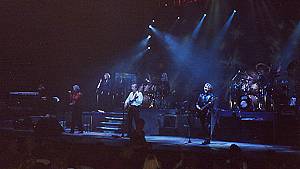 The Moody Blues in
concert is still an inspiring musical happening. These recent concerts
witnessed the band performing tracks from their 1999 CD Strange
Times as well as late ‘60s Moody Blues album classics such as In
Search Of The Lost Chord and
Days Of Future Passed, their 1972 best-seller Seventh
Sojourn and more recent ‘80s albums like Sur La Mer and Long Distance
Voyager. In fact, just about the only thing missing from these first
Moody Blues concerts of the 21st Century was the commanding Mellotron
keyboards of founding member Mike
Pinder who left the band following his decision to stop touring in
1978. The Moody’s considerable compendium of phenomenal studio and live
albums is admittedly still the stuff that will make them legends for
generations to come but the kicker is that many long time fans gratefully
concede that Strange Times is the band’s most rewarding and creative album in
over ten years. The Moodys’
2000 line-up still features founding members Ray
Thomas (flutes, vocals) and Graeme
Edge (drums) with the group’s long standing guitarists/vocalists Justin
Hayward (lead/rhythm guitar) and
John Lodge (bass) still
assuming the lion’s share of the group’s songwriting chores. Taking
time out of their busy touring schedules, both Justin Hayward and John
Lodge were more than happy to reflect back on nearly 35 years of Moody
Blues history for an interview with mwe3.com CD reviews editor Robert
Silverstein. Among the topics discussed were the Moody’s
ground-breaking 1969 album To Our
Children’s Children’s Children, the group’s new album Strange
Times, memories of the ‘60s, keyboard icon Mike Pinder, the band’s
esteemed producer Tony Clarke, solo careers and the future of The Moody
Blues. The following telephone interviews with Justin Hayward and John
Lodge were conducted by Robert Silverstein on Friday February 18, 2000.
The Moody Blues in
concert is still an inspiring musical happening. These recent concerts
witnessed the band performing tracks from their 1999 CD Strange
Times as well as late ‘60s Moody Blues album classics such as In
Search Of The Lost Chord and
Days Of Future Passed, their 1972 best-seller Seventh
Sojourn and more recent ‘80s albums like Sur La Mer and Long Distance
Voyager. In fact, just about the only thing missing from these first
Moody Blues concerts of the 21st Century was the commanding Mellotron
keyboards of founding member Mike
Pinder who left the band following his decision to stop touring in
1978. The Moody’s considerable compendium of phenomenal studio and live
albums is admittedly still the stuff that will make them legends for
generations to come but the kicker is that many long time fans gratefully
concede that Strange Times is the band’s most rewarding and creative album in
over ten years. The Moodys’
2000 line-up still features founding members Ray
Thomas (flutes, vocals) and Graeme
Edge (drums) with the group’s long standing guitarists/vocalists Justin
Hayward (lead/rhythm guitar) and
John Lodge (bass) still
assuming the lion’s share of the group’s songwriting chores. Taking
time out of their busy touring schedules, both Justin Hayward and John
Lodge were more than happy to reflect back on nearly 35 years of Moody
Blues history for an interview with mwe3.com CD reviews editor Robert
Silverstein. Among the topics discussed were the Moody’s
ground-breaking 1969 album To Our
Children’s Children’s Children, the group’s new album Strange
Times, memories of the ‘60s, keyboard icon Mike Pinder, the band’s
esteemed producer Tony Clarke, solo careers and the future of The Moody
Blues. The following telephone interviews with Justin Hayward and John
Lodge were conducted by Robert Silverstein on Friday February 18, 2000.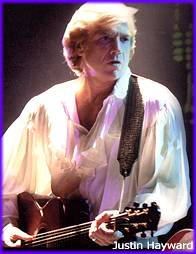 RS:
Hi Justin! I’m the CD review editor for the new online CD review web site
mwe3.com. I can’t wait to see The Moody Blues play at the Tropicana on
Saturday night. Y’know, I really enjoy the new Moody Blues album
RS:
Hi Justin! I’m the CD review editor for the new online CD review web site
mwe3.com. I can’t wait to see The Moody Blues play at the Tropicana on
Saturday night. Y’know, I really enjoy the new Moody Blues album 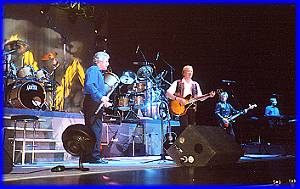
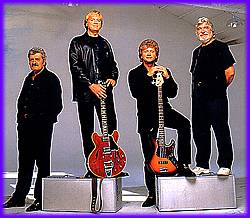 That was the only track the Moody Blues ever made in our own studio. We had
the first fully equipped Westlake sound studio in Europe. John and I made
the Blue Jays album in it. But of course we’d split up in ‘74 or ‘73.
And then Octave was made in
America, and so Long Distance Voyager was
the only album that we actually made in our own studio, because Decca was
sold a year after that. And so we lost the studio and all the real estate
that went with Decca because the studio was part inside the record company.
I mean it was a milestone album for us really. I think if that hadn’t
worked, I think that life would have been very different. But a lot of
things came right at the right time. I think Patrick Moraz...he really kind
of peaked on it. He really kind of gave his all on it. He was a big
contributor to it. But I think we had the right songs and it was the right
kind of feeling at the right time. I’d just discovered the Linn drum and
electronic drums in general, so our tempos were much, much tighter. And we
started to make real quality demos as well beforehand. It was a long album
to make but it was much tighter in feel.
That was the only track the Moody Blues ever made in our own studio. We had
the first fully equipped Westlake sound studio in Europe. John and I made
the Blue Jays album in it. But of course we’d split up in ‘74 or ‘73.
And then Octave was made in
America, and so Long Distance Voyager was
the only album that we actually made in our own studio, because Decca was
sold a year after that. And so we lost the studio and all the real estate
that went with Decca because the studio was part inside the record company.
I mean it was a milestone album for us really. I think if that hadn’t
worked, I think that life would have been very different. But a lot of
things came right at the right time. I think Patrick Moraz...he really kind
of peaked on it. He really kind of gave his all on it. He was a big
contributor to it. But I think we had the right songs and it was the right
kind of feeling at the right time. I’d just discovered the Linn drum and
electronic drums in general, so our tempos were much, much tighter. And we
started to make real quality demos as well beforehand. It was a long album
to make but it was much tighter in feel.